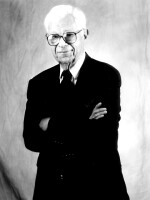MELISSA BLOCK, host:
Today, President Bush made his strongest remarks yet on the crisis in Georgia. He accused Russia of violating the cease-fire, but he did note that Russia says its goal in Georgia is not regime change. NPR's senior news analyst Daniel Schorr says all available evidence suggests otherwise.
DANIEL SCHORR: Don't be misled by the fragile cease-fire in Georgia. Russia is clearly out to show that the United States has no patent on forcible regime change in its own strategic interests.
The democratic regime of President Mikhail Saakashvili, befriended and armed by the United States and an applicant for NATO membership, is clearly regarded as a threat to Russia's security in the Caucasus that goes far beyond the two ethnic enclaves near the border.
Georgia represents the latest failure in Russia's effort to establish a zone of special influence in its neighborhood. After the collapse of the Soviet Union in 1991, Russia sought to transform an empire into a voluntary association, as Britain had done, but the so-called Commonwealth of Independent States hardly got off the ground.
Georgia has now resigned from it, and representatives of other former Soviet republics - the Baltic states, the Ukraine - have flown to Tbilisi to declare solidarity with Saakashvili.
The invasion of Georgia, nominally to rescue two enclaves, also looked like payback for American and European recognition of Kosovo as a state independent of Serbia.
The Putin-Medvedev regime has apparently decided to annex the two enclaves of South Ossetia and Abkhazia and treat them as integral parts of Russia, like Chechnya.
Pressure on Saakashvili is likely to increase, demanding his resignation and the withdrawal of Georgia's application for NATO membership. The Bush administration, along with both presidential candidates, have condemned the Russian move. It is not evident what other action is contemplated. This is Daniel Schorr. Transcript provided by NPR, Copyright NPR.






